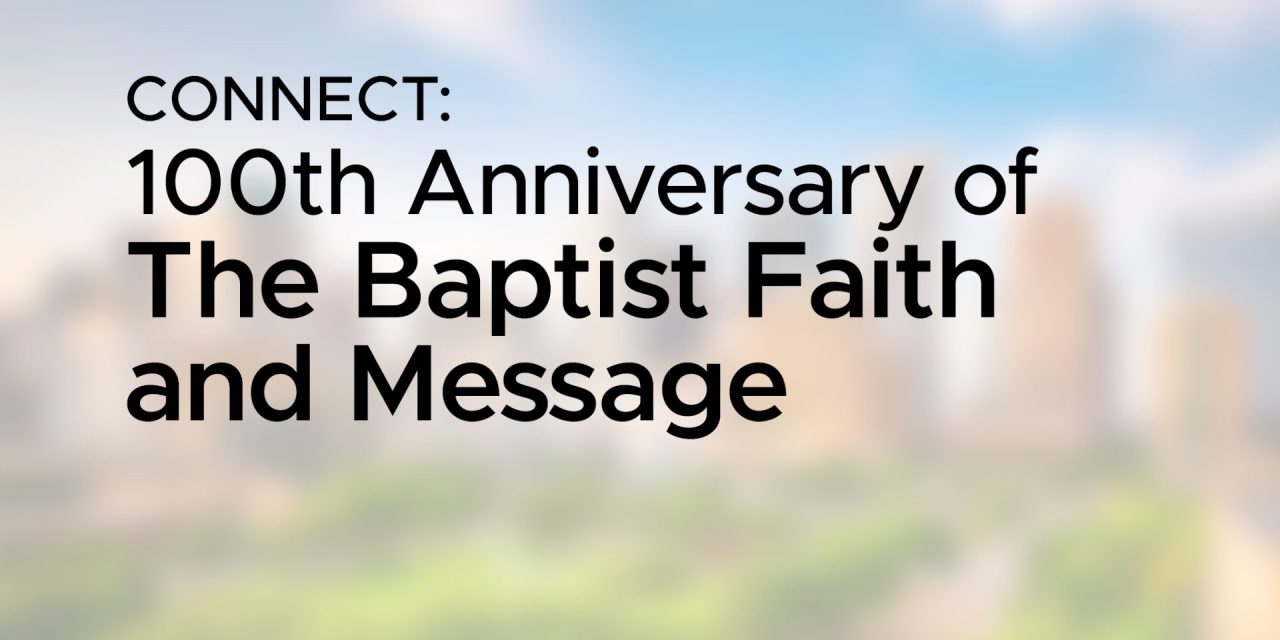This year Southern Baptists are celebrating the 100th anniversary of the Cooperative Program. The Cooperative Program, which I wrote about in last month’s Messenger, is the unique way all Southern Baptist churches can contribute to the mission and ministry endeavors of the Southern Baptist Convention (SBC) with maximum effectiveness and impact. We should well celebrate the Cooperative Program and all that our churches have done for the Kingdom through it. At the same time, there is something else very important to Southern Baptists that also celebrates its 100th anniversary this year: the Baptist Faith and Message.
In the early part of the 20th century, mainline denominations were embattled in theological controversy as they sought to deal with the rise of skepticism toward Christianity brought largely about by the growing acceptance of naturalism and modernism amongst the American public. In American religious history, this time period is known as the “Fundamentalist-Modernist Controversy.” A battle between theological liberals and conservatives, largely played out in the Presbyterian denomination, was waged for control of seminaries and churches.
Harry Emerson Fosdick’s infamous sermon, “Shall the Fundamentalists Win?” argued that if Christianity were to survive the modern age it must reject claims of the supernatural (e.g. virgin birth, miracles, bodily resurrection) that went against the standards of science. John D. Rockefeller paid for 130,000 copies of the sermon to be sent to every Protestant pastor in America. J. Gresham Machen responded to Fosdick with his book Christianity and Liberalism in which he argued the beliefs of Fosdick and his supporters were so aberrant from Christian orthodoxy that it would be impossible to consider them Christians. The Fundamentalist-Modernist Controversy divided the Presbyterians with the liberals winning control.
Observing this controversy were Southern Baptists who did not wish to see the same thing happen in their convention. A commission was formed, led by E.Y. Mullins, to produce a confession of standard beliefs upon which cooperating Southern Baptists could all agree.
The result is what we now know as the Baptist Faith and Message (BF&M), approved by messengers in the 1925 Annual Meeting. The BF&M is not a creed whereby churches are compulsorily forced to obey, which would be a violation of Baptist polity and autonomy of churches. Rather, the BF&M is a confession where Southern Baptists who wish to cooperate with one another voluntarily affirm the beliefs contained within the BF&M. The BF&M was revised in 1963 and again in 2000 by messengers to ensure the convention’s biblical fidelity.
The BF&M lays out the beliefs of Southern Baptists in regard to our understanding of the Bible’s teachings on the cardinal doctrines of the faith. The genius behind the BF&M is that it serves as guardrails for our cooperation with another—it is narrow enough to keep us within the confines of biblical orthodoxy and wide enough to allow us to have differences amongst our churches. For example, the BF&M is clear about the importance and necessity of justification by faith, but allows room for those within the SBC to have a variance of beliefs on soteriology, such as being Reformed or non-Reformed. The BF&M is clear about the necessity of Jesus’ Second Coming, but allows for differences in eschatology such as amillennialism, premillennialism, or postmillennialism.
As Baptists, we cannot hold firmly to church autonomy and at the same time expect every church to believe exactly the same way. That said, we can expect every church to hold to an orthodox view of the cardinal doctrines in the Bible. Baptists have historically never sought unanimity, but rather unity around core beliefs and a shared desire to reach the world with the Gospel of Jesus Christ. The BF&M helps us do just that. I am grateful to serve within a collection of churches that take seriously the Bible and the Great Commission!
To read the BF&M text, visit bfm.sbc.net/bfm2000/.




